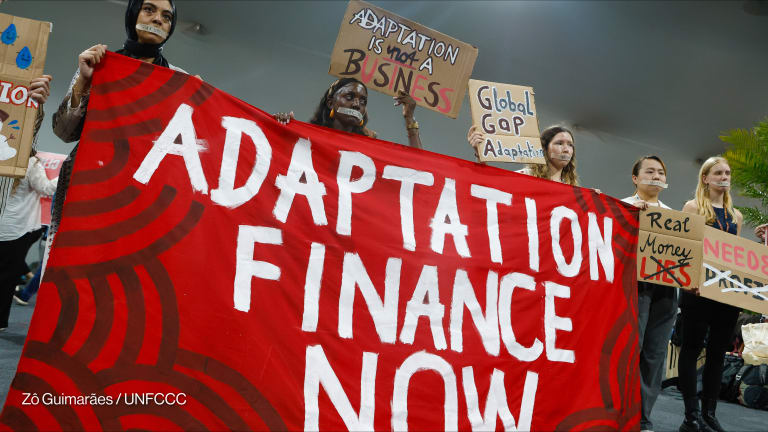
If the new global climate agreement to be adopted in Paris in December is to result in lasting and significant change, it must respond to the central roles that women play in building resilience and supporting zero-carbon, sustainable development.
We all feel the effects of climate change in our lives, whether through heat waves, droughts, intense storms or rising coastal waters. But in developing countries, women and girls often pay the heaviest and most consistent price. As women and girls are more likely to bear the responsibility for gathering water and firewood, and often grow food to feed their families and earn income, their lives are inextricably tied to the environment. Climate-related disasters also hit them hard, sometimes because of barriers to their mobility and access to information.
On a daily basis, increasing levels of drought, desertification and deforestation — particularly in sub-Saharan Africa — mean that women and girls have to devote more time to basic subsistence. A study in 25 countries in sub-Saharan Africa estimated that women cumulatively spend at least 16 million hours a day collecting drinking water, more than twice as many hours as men.
In rural areas of Somalia, for instance, one trip back and forth to a water source takes on average one hour and 22 minutes, and one trip might not even be enough to cover a household’s daily water needs. This leaves women and girls with less time for getting an education, earning money, learning new skills or participating in public life.
Women also make up an average of 50 percent of the agricultural work-force in East and Southeast Asia and sub-Saharan Africa, and much more in some countries, which also leaves them particularly vulnerable to flash floods, drought and other effects of climate change. When environmental disasters strike, women are on the front lines, and their livelihoods are at risk.
Despite their substantial role in agriculture, however, women across these regions have less access than men to productive resources and opportunities — from land and livestock, to education, agricultural extension and financial services, and technology. Leveling this playing field would have a dramatic impact on agricultural production, food security and the resilience of communities to adapt to climate change.
Changing the game on development means recognizing that women are not just victims of climate change, they also are powerful agents of change. Women bring local knowledge and experience that can make natural resource management and climate change adaptation more successful.
In collaboration with the Global Environment Facility, the United Nations Development Program is supporting initiatives throughout the world that demonstrate women’s agency in responding to climate change.
For instance, our partnership with the Barefoot College in India is training women in 18 countries in Africa and Asia to create off-grid solar electrification for poor communities, using clean, low-cost solar energy. The project is promoting renewable energy as an alternative to fuel like wood and kerosene, thus reducing deforestation, carbon dioxide emissions, and air pollution.
In Cambodia, UNDP is supporting improved access for women to climate information, water resources and climate-resilient farming practices. Women are now taking on leadership roles in Water User Groups, driving the design and implementation of new irrigation practices, and earning income through diversifying their livelihoods. They are now not only contributors of household income, but also champions of climate change adaptation.
In rural Tajikistan, where households have electricity only one to three hours a day, UNDP helped train villagers, more than half of whom were women, to assemble solar water heaters using locally available materials. The ability to construct their own solar water heaters was invaluable to the female participants, many of whose husbands have migrated away in search of work. By building solar heating systems, these women not only secured permanent access to warm water, but have relieved themselves both of the labor and health risks of gathering and burning biomass to heat water for household use.
Each of these examples demonstrates the pivotal role that women can play as climate leaders by spearheading initiatives to mitigate carbon emissions and adapt to climate change. A successful and forward-thinking Paris agreement should ensure the participation of women in climate action globally, and help to scale up initiatives like these — whenever and wherever possible. Outside of the agreement, financing for climate change — whether from private sector partners or multilateral funds such as the Green Climate Fund — must recognize the differentiated roles women and men play in climate change and allocate resources accordingly.
Paris is the start on the path to a zero-carbon future. Let’s make sure that women and men everywhere are empowered to help lead us down that path.
Planet Worth is a global conversation in partnership with Abt Associates, Chemonics, HELVETAS, Tetra Tech, the U.N. Development Program and Zurich, exploring leading solutions in the fight against climate change, while highlighting the champions of climate adaptation amid emerging global challenges. Visit the campaign site and join the conversation using #PlanetWorth.


